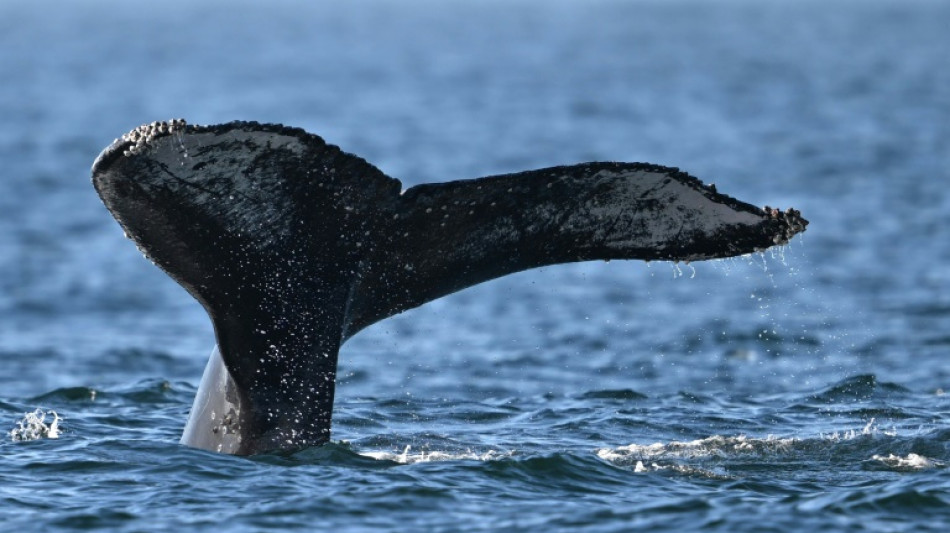
-
 Castle's monster night fuels Spurs, Rockets rally to beat Thunder
Castle's monster night fuels Spurs, Rockets rally to beat Thunder
-
Japan votes in snow-hit snap polls as Takaichi eyes strong mandate

-
 Pakistan's capital picks concrete over trees, angering residents
Pakistan's capital picks concrete over trees, angering residents
-
Berlin's crumbling 'Russian houses' trapped in bureaucratic limbo

-
 Neglected killer: kala-azar disease surges in Kenya
Neglected killer: kala-azar disease surges in Kenya
-
Super Bowl set for Patriots-Seahawks showdown as politics swirl

-
 Sengun shines as Rockets rally to beat NBA champion Thunder
Sengun shines as Rockets rally to beat NBA champion Thunder
-
Matsuyama grabs PGA Phoenix Open lead with Hisatsune one back

-
 Washington Post CEO out after sweeping job cuts
Washington Post CEO out after sweeping job cuts
-
Haiti's transitional council hands power to PM

-
 N. Korea to hold party congress in February, first since 2021
N. Korea to hold party congress in February, first since 2021
-
Thailand votes after three leaders in two years

-
 Swiss joy as Von Allmen wins first gold of Winter Olympics
Swiss joy as Von Allmen wins first gold of Winter Olympics
-
George backs England to 'kick on' after Six Nations rout of Wales

-
 Malinin upstaged as Japan keep pressure on USA in skating team event
Malinin upstaged as Japan keep pressure on USA in skating team event
-
Japan's Kimura soars to Olympic gold in snowboard big air final

-
 Vail's golden comets Vonn and Shiffrin inspire those who follow
Vail's golden comets Vonn and Shiffrin inspire those who follow
-
Veteran French politician loses culture post over Epstein links

-
 Japan's Kimura wins Olympic snowboard big air gold
Japan's Kimura wins Olympic snowboard big air gold
-
Arteta backs confident Gyokeres to hit 'highest level'

-
 Hojlund the hero as Napoli snatch late win at Genoa
Hojlund the hero as Napoli snatch late win at Genoa
-
England's Arundell 'frustrated' despite hat-trick in Wales romp

-
 Lollobrigida skates to first Italian gold of Winter Olympics on her birthday
Lollobrigida skates to first Italian gold of Winter Olympics on her birthday
-
Arundell hat-trick inspires England thrashing of Wales in Six Nations opener

-
 Chile's climate summit chief to lead plastic pollution treaty talks
Chile's climate summit chief to lead plastic pollution treaty talks
-
Rosenior hails 'unstoppable' Palmer after treble tames Wolves

-
 French ex-minister offers resignation from Paris cultural hub over Epstein links
French ex-minister offers resignation from Paris cultural hub over Epstein links
-
New NBA dunk contest champ assured and shooting stars return

-
 Shiffrin says will use lessons learnt from Beijing flop at 2026 Games
Shiffrin says will use lessons learnt from Beijing flop at 2026 Games
-
Takaichi tipped for big win as Japan votes

-
 Lens return top of Ligue 1 with win over Rennes
Lens return top of Ligue 1 with win over Rennes
-
Shiffrin learning from Beijing lessons ahead of Milan-Cortina bow

-
 Demonstrators in Berlin call for fall of Iran's Islamic republic
Demonstrators in Berlin call for fall of Iran's Islamic republic
-
'Free the mountains!": clashes at Milan protest over Winter Olympics

-
 Townsend accepts pressure will mount on him after Italy defeat
Townsend accepts pressure will mount on him after Italy defeat
-
BMW iX3 new style and design

-
 Suryakumar's 84 leads India to opening win over USA in T20 World Cup
Suryakumar's 84 leads India to opening win over USA in T20 World Cup
-
Lollobrigida skates to first Italian gold of Milan-Cortina Games

-
 Barca beat Mallorca to extend Liga lead
Barca beat Mallorca to extend Liga lead
-
Gyokeres lifts Arsenal nine clear as Man Utd pile pressure on Frank

-
 Late Guirassy winner for Dortmund trims Bayern's lead atop Bundesliga
Late Guirassy winner for Dortmund trims Bayern's lead atop Bundesliga
-
'Free the mountains!": protest in Milan over Winter Olympics

-
 Gyokeres double helps Arsenal stretch Premier League lead
Gyokeres double helps Arsenal stretch Premier League lead
-
New Skoda Epiq: modern with range

-
 Six Nations misery for Townsend as Italy beat sorry Scotland
Six Nations misery for Townsend as Italy beat sorry Scotland
-
Spain, Portugal face fresh storms, torrential rain

-
 Opinions of Zuckerberg hang over social media addiction trial jury selection
Opinions of Zuckerberg hang over social media addiction trial jury selection
-
Over 2,200 IS detainees transferred to Iraq from Syria: Iraqi official

-
 Norway's Ruud tops Olympic men's freeski slopestyle qualifying
Norway's Ruud tops Olympic men's freeski slopestyle qualifying
-
Czech qualifier Bejlek claims first title in Abu Dhabi


Whaling: why the practice will not go away
The detention in Greenland of anti-whaling campaigner Paul Watson pending possible extradition to Japan has turned the spotlight on the widely condemned practice of hunting whales.
A 1986 moratorium on commercial whaling allowed numbers to recover following centuries of hunting that decimated the population to near-extinction.
Today three countries still permit the practice -- Japan, Norway and Iceland.
Beyond the moral case against whaling, as made in campaigns such Watson's, what is the science driving the arguments both for and against the practice?
- 'Scientific' whaling? -
In 2019 Japan quit the International Whaling Commission moratorium and resumed commercial whaling inside its territorial waters and exclusive economic zone.
Before this, Japan had been pursuing "scientific research" whaling since 1987, arguing some data could only be collected from dead carcasses.
But the evidence to support the claim was thin, Paul Rodhouse, fellow of the Marine Biological Association in Britain, told AFP.
"There seems to be very little justification for scientific whaling and few worthwhile scientific studies," he said.
A study published in Marine Policy in 2016 found that whaling and non-whaling countries had produced similar numbers of scientific papers on whales between 1986 and 2013.
If we consider all the whales captured "and compare them to the very, very small number of scientific publications produced, we say to ourselves it really wasn't worth it and the scientific objectives were certainly not the priority of this activity", Vincent Ridoux, a marine megafauna researcher at La Rochelle university in France, told AFP.
There is also plenty of non-invasive research being carried out on living whales using increasingly sophisticated technology.
Those tools include satellite transmitters attached to the mammals, passive acoustic devices in submarine vessels, satellite imagery and artificial intelligence.
- Are whales still endangered? -
Overall, the moratorium has been successful in enabling the whale population to recover.
But there remain sharp variations between regions and species.
Japan hunts Bryde's, minke and sei whales, and wants to expand its list to include fin whales as well.
The government says the species are "abundant" and that catching them around Japan in limited numbers is sustainable.
The Bryde's and common minke are listed as being of "least concern" on the International Union for the Conservation of Nature's Red List, but globally the sei is "endangered", and fin whales are listed as "vulnerable".
Whales also face other threats besides hunting, including ship collisions, entanglements with fishing nets and rising ocean temperatures.
- Whales and ecosystems -
"Conserving biodiversity is not just a case of saving 'charismatic macrofauna' but maintaining balanced ecosystems for the continued health of nature and humans," Rodhouse said.
Abundant whales in an ecosystem "contribute to enriching the surface layers with mineral salts and mineral elements such as iron", said Ridoux.
Those elements are a key source of nutrients for some organisms.
Because whales breathe at the surface, they release much of what they consume there, providing a food source for surface-dwelling marine organisms.
- 'Disturbing' development -
In May, Japan launched a new "mothership" for its whaling fleet to replace its previous lead vessel, retired in 2023.
Weighing in at nearly 9,300 tonnes, the "Kangei Maru" is a substantial upgrade and has raised alarm in the scientific community.
"It is very disturbing because it is a ship of large dimensions, it can go very far and therefore has probably very high operating costs," said Ridoux.
"If you want to use a boat like this in a commercial logic, you need big quotas to balance the operating costs and there has to be a market for that."
Tokyo argues that eating whale is part of Japanese culture and an issue of "food security" in the resource-poor country, which imports large amounts of animal meat.
But whether or not there is a big appetite in Japan for the meat is an open question.
Consumption has declined significantly in recent decades to around 1,000 or 2,000 tonnes per year compared to around 200 times that in the 1960s.
I.Matar--SF-PST




